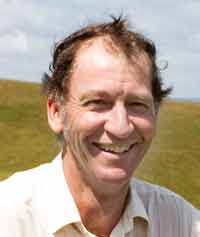2010 FW Awards: Sheep Farmer of the Year finalist – David Rossiter

A focus on expanding the farm’s sheep flock following the hard decision to disperse the dairy herd due to TB has been the catalyst for change on David Rossiter’s 1004 acre unit on the South Devon coast.
“In July 2007 the decision was pretty much forced on me to cease dairying because of TB. I was despairing at seeing cow families I’d worked hard to breed being destroyed by the disease – the economics of the situation dictated that change was needed.”
With David already recognised as one of the UK’s leading Poll Dorset breeders and a long-established flock of Suffolks also on the farm, expanding the sheep enterprise to use the available grassland was the logical step.
“The system has shifted from an intensive one propped up by fertiliser use to one which balances the 220 acres of arable with the sheep requirements and the environmental income the farm has from a number of schemes.
“Grass growth here is seasonal, with good growth for most of the year, apart from six weeks in winter and a period from early July to mid-September.”
And it is for this reason that the Poll Dorsets were chosen as the base for the business many years ago. “The breed’s out of season lambing suits grass growth here and enables me to maximise income from the flock.”
But it is not just the natural environment which David strives to work in harmony with, his commercial customers for breeding rams are also central to his breeding policy. “The customer is king, performance recording is central to selection in the Poll Dorset and Suffolk flocks and commercially viable traits are at the forefront of the selection criteria. Additionally I am now looking at gene markers, as a way to improve the quality of the Suffolk flock, introducing the myomax gene through the use of a Sire Line ram.”
Marketing from the flocks is undertaken through a variety of means, with most stock sold from home. About half the rams produced are sold at sales, including the top end of the Poll Dorsets which are sold at the breed’s annual May Fair sale and other breed society sales. “The utopia would be to be able to sell all of a mating season’s progeny before turning the rams out. Slaughter lambs are already sold on contract to Waitrose, while Aberdale cross ewe lambs are sold on contract back to Innovis.
“Further to that a good number of Lleyn x Poll Dorset ewes are sold as embryo recipients, with the order book for these full for next year already.”
Recent developments have seen David also introduce Dorper and Katahdin flocks in a bid to develop an easier care, wool shedding maternal line through his involvement with the South West Sheep Improved Genetics.
“I’m aiming for a naturally shepherded flock, with sheep able to look after themselves while still leaving a profit for me. The Kathadin is bringing more size and conformation to the wool-shedding sheep, something I believe they need.”
Grassland on the farm is largely permanent pasture managed under a number of environmental schemes, leaving little opportunity for new leys, explains David. “We are able to use kale as a winter crop for the shearling rams which helps keep the cost of producing them to a minimum.”
Productivity in the flocks is strong, with the autumn lambing Poll Dorset flock scanning at 154% and other flocks at or above these levels. “Poll Dorset lambs sold for slaughter cost £3.70/kg to produce, with the contract paying £4.31kg and carcasses averaging more than 19kg. Forward contracting these lambs gives me stability and security, rather than the usual risk associated with lamb marketing.”
WHAT THE JUDGES LIKED
• Innovative approach to sheep farming
• Exciting breeding programme
• Enthusiasm for the sheep industry
• Focused on maximising marketing possibilities
FARM FACTS
• 1004 acre grass and arable unit
• 1100 ewes
• Two pedigree flocks
• Developing new composite breeds
